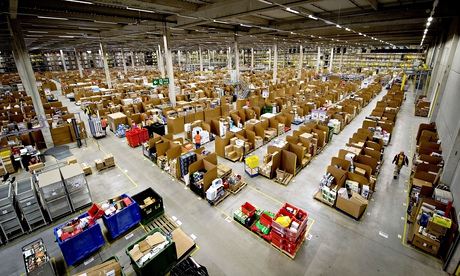
Amazon's move to scrap free delivery on orders below £10 has hit profits at Royal Mail, sending its shares down to their lowest level since the postal service's controversial flotation last October.
In a trading update ahead of its first annual shareholder meeting on Thursday, the 500-year-old institution warned that the performance of its crucial parcels business had been weaker than expected.
The shares, floated at 330p, were the second biggest faller in the FTSE 100, losing 16p to finish at 450p. In January they were changing hands at 615p.
Chief executive Moya Greene said the business was facing increasingly tough competition, with parcels revenue – supposed to be the driver of growth in the business – down 1% over the three months to the end of June.
Overall revenues were up 2% over the three months to the end of June as a result of a rise in election mailouts in the run-up to the May elections and the March increase in stamp prices, which saw the cost of a first class letter rise 2p to 62p. However, letter post is in long-term decline.
Richard Hunter, head of Equities at Hargreaves Lansdown stockbrokers, said the honeymoon period for Royal Mail was over.
"The weakness in the parcels performance is a concern, and may prompt questions as to whether this is transient, or whether the change is structural," he said. "The fact that this decline has been offset by an improvement in the letters business, which is not a long-term area of growth, and cost-cutting measures, may help in the shorter term, but these are both temporary reliefs."
Royal Mail blamed the slip in its parcels business on Amazon's decision to introduce a £10 minimum spend for free delivery. Amazon has also expanded its own delivery network. The online retail giant scrapped free "super-saver" delivery on items worth less than £10 in January, introducing a minimum spend, which resulted in fewer parcels being delivered through Royal Mail.
The post service also faces stiff competition in its main UK parcels market from rivals including UPS, TNT and Yodel.
In the UK letters remain the biggest earner for Royal Mail, bringing in 59% of its income compared with 41% from parcels. However, letters are expected to decline by around 4% to 6% each year, while parcel delivery is usually seen as a growth business as consumers embrace online shopping.
In its letters arm Royal Mail has warned that a rival TNT Post UK delivery service, that targets only the most profitable areas of Britain, could hit its revenue by over £200m by 2017/18, threatening the future of its own six-day-a-week universal service.
The group attempted to mitigate the impact of the TNT rollout by proposing a price rise for rivals using the Royal Mail network, but abandoned the move when TNT complained to Ofcom, prompting an investigation by the regulator.
Royal Mail is not changing its forecast for full-year profits, although last week it warned it could face a hefty fine from French authorities, who are investigating alleged anti-competitive practices at Royal Mail's French parcel delivery business. TNT Express and FedEx are also being investigated and face possible fines. The group's European parcel delivery business, GLS, which operates in 37 countries, turned in a robust performance, with revenues up 6%.
Greene said that trading had been characterised by a good performance in the letters business, but "a weaker than expected performance in UK parcels, largely driven by the intensifying competitive environment".
Cantor Fitzgerald analyst Robin Byde, who has a "sell" rating on Royal Mail shares, said Royal Mail could be in for a bumpy ride as rivals sharpen their prices: "The key challenge remains weakness in parcel pricing in the UK. In our view, the company faces a considerable volume and pricing challenge in parcels in the next 18 months."
Greene will face shareholders in Birmingham on Thursday, where she is expected to face questions over her £1.35m salary and pay package, as well as threats to Royal Mail's universal service obligation – the pledge to deliver letters at the same price to all parts of the country six days a week.
• This article was amended on 23 July

